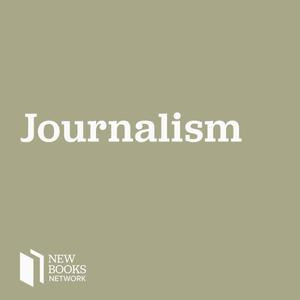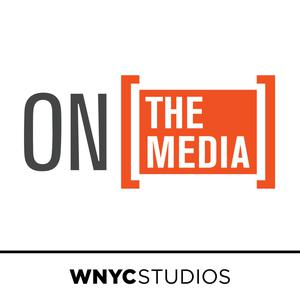
New Books in Journalism
Interviews with Scholars of Journalism about their New Books
- 1 hour 8 minutesMatthew Lynn: Journalist and Author Turned Publishing Entrepreneur
In this podcast, Matthew talks about his late entry into entrepreneurship, taking advantage of opportunities that emerged as Kindle offered a new way to distribute books. In his career as a journalist with well known business publications he enjoyed talking to entrepreneurs, even having his editor turn down his pitch to interview Amazon founder Jeff Bezos. Starting a business was something he had always been open to, but journalism came first until quite late in life. He shares how his initial idea of publishing short-form books from well-known authors pivoted into the bigger opportunity of publishing back catalogues. Matthew describes how and why larger publishers missed the boat due to conservative pricing and a feeling that ebooks might just "go away." He discusses the importance of a "problem-solving mindset," persistence, and being ready to hustle. We learn what being a fiction author has in common with being an entrepreneur, and how crucial it is to handle and manage rejection. Matthew also delves into his path to an exit, the loyalty he felt to his authors and staff, and the challenges of management and leadership. He particularly highlights the learning process of dealing with the fact that the founder is often more motivated than the people they hire.
Links relevant to the interview.
Matthew’s books Death Force series
Joffe Books - acquired by Lume Books
Matthew’s Bio
- Daily Telegraph - columnist - 2013-2024
- Money Week - columnist - 2008-2024
- Bloomberg - columnist - 1999-2012
- The Sunday Times - Reporter and columnist - 1992-2000
- Business magazine - reported - 1988-1991
- Asiaweek, Hong Kong - 1986-1988
- Financial Adviser magazine - 1985-1986
- Founder - Lume Books - 2013- 2023
Author
- Death Force - Hodder Headline - 2010
- Fireforce - Hodder Headline - 2011
- Shadow Force - Hodder Headline - 2012
- Ice Force - Hodder Headline - 2013
- Insecurity - Random House - 1997
- The Watchmen - Random House - 1999
Education:
- Balliol College, Oxford. Politics, Philosophy & Economics.
Richard Lucas’s TEDx talk on Opportunity Readiness and on Why everyone should embrace rejection
Learn more about your ad choices. Visit megaphone.fm/adchoices
Support our show by becoming a premium member! https://newbooksnetwork.supportingcast.fm/journalism
10 January 2025, 9:00 am - 52 minutes 6 secondsPeter Hessler, "Other Rivers: A Chinese Education" (Penguin, 2024)
In 2019, journalist and writer Peter Hessler traveled with his family to China. He’d gotten a gig as a teacher of writing—nonfiction writing in particular—in what he’d hoped would be a sequel to his 2001 book River Town: Two Years on the Yangtze.
But plans changed—radically. At the very end of 2019, the COVID-19 virus emerges in Wuhan, leading to chaos as officials frantically try to figure out how to control the new disease. Peter’s reporting first wins his criticism from Chinese nationalists angry about his frank discussions of China’s mistakes—then criticism from U.S. hawks angry that Hessler gives Beijing credit for what it managed to do right as COVID rapidly spreads around the world.
Peter’s years in China are covered in his latest book Other Rivers: A Chinese Education (Penguin Press, 2024), published last year.
Peter Hessler is a staff writer at the New Yorker, where he served as Beijing correspondent from 2000 to 2007, Cairo correspondent from 2011 to 2016, and Chengdu correspondent from 2019 to 2021. He is the author of The Buried: An Archaeology of the Egyptian Revolution; River Town: Two Years on the Yangtze, which won the Kiriyama Book Prize; Oracle Bones: A Journey Between China's Past and Present, which was a finalist for the National Book Award; Country Driving: A Chinese Road Trip; and Strange Stones: Dispatches from East and West. He won the 2008 National Magazine Award for excellence in reporting, and he was named a MacArthur fellow in 2011.
You can find more reviews, excerpts, interviews, and essays at The Asian Review of Books, including its review of Other Rivers. Follow on Twitter at @BookReviewsAsia.
Nicholas Gordon is an editor for a global magazine, and a reviewer for the Asian Review of Books. He can be found on Twitter at @nickrigordon.
Learn more about your ad choices. Visit megaphone.fm/adchoices
Support our show by becoming a premium member! https://newbooksnetwork.supportingcast.fm/journalism
9 January 2025, 9:00 am - 29 minutes 10 secondsAlex Cuadros, "When We Sold God's Eye: Diamonds, Murder, and a Clash of Worlds in the Amazon" (Grand Central Publishing, 2024)
Growing up in a remote corner of the world’s largest rainforest, Pio, Maria, and Oita learned to hunt wild pigs and tapirs, and gathered Brazil nuts and açaí berries from centuries-old trees. The first highway pierced through in 1960. Ranchers, loggers, and prospectors invaded, and the kids lost their families to terrible new weapons and diseases. Pushed by the government to assimilate, they struggled to figure out their new, capitalist reality, discovering its wonders—cars, refrigerators, TV sets, phones—as well as a way to acquire them: by selling the natural riches of their own forest home. They had to partner with the white men who’d hunted them, but their wealth grew legendary, the envy of the nation—until decades of suppressed trauma erupted into a massacre, bloody retribution that made headlines across the globe.
Based on six years of immersive reporting and research, When We Sold God's Eye: Diamonds, Murder, and a Clash of Worlds in the Amazon (Grand Central Publishing, 2024) tells a unique kind of adventure story, one that begins with a river journey by Theodore Roosevelt and ends with smugglers from New York City’s Diamond District. It’s a story of survival against all odds; of the temptations of wealth and the dream of prosperity; of an ecosystem threatened by our hunger for resources; of genocide and revenge. It’s a tragedy as old as the first European encounters with Indigenous people, playing out in the present day. But most of all, it’s the moving saga of a few audacious individuals—Pio, Maria, Oita, and their friends—and their attempts to adapt and even thrive in the most unlikely circumstances.
Learn more about your ad choices. Visit megaphone.fm/adchoices
Support our show by becoming a premium member! https://newbooksnetwork.supportingcast.fm/journalism
8 January 2025, 9:00 am - 52 minutes 30 secondsScott Huver, "Beverly Hills Noir: Crime, Sin, & Scandal in 90210" (Post Hill Press, 2024)
Beverly Hills Noir: Crime, Sin, & Scandal in 90210 (Post Hill Press, 2024) explores the city’s true crime history, delving deep inside cases that made headlines, scandals that engulfed Hollywood legends, and more strange-but-true tales that could only happen in the 90210. Beverly Hills Noir chronicles an assortment of jaw-dropping true crime stories spanning the legendary city’s history, each with oh-so-90210 twists—including a high-profile murder mystery in the city’s most extravagant mansion, the daring exploits of a handsome cat burglar with movie star looks, a toxic Tinseltown love triangle that ended in gunplay, a brazen Rodeo Drive jewelry store holdup with tragically stunning finale, an Oscar nominated actress on shoplifting spree and more—complete with major roles and countless cameos by Hollywood idols and cultural icons. A gripping, century-long tour of the glamorous city’s shadowy underbelly through crimes and misdemeanors as over-the-top as the city itself, Beverly Hills Noir collects the kinds of stories you’d expect to be swapped if James Ellroy and Dominick Dunne had met Jackie Collins and Ryan Murphy for cocktails at the Polo Lounge. It’s Sunset Boulevard and Once Upon a Time… in Hollywood turned sordid, face-down-in-the-pool reality.
Scott Huver has covered the inner workings of Beverly Hills, the entertainment industry, and the Los Angeles-area elite for three decades.
Caleb Zakarin is editor at the New Books Network.
Learn more about your ad choices. Visit megaphone.fm/adchoices
Support our show by becoming a premium member! https://newbooksnetwork.supportingcast.fm/journalism
22 December 2024, 9:00 am - 56 minutes 42 secondsRobert Danisch, "Rhetorical Democracy: How Communication Shapes Political Culture" (Rowman and Littlefield, 2024)
Rhetorical Democracy: How Communication Shapes Political Culture (Rowman and Littlefield, 2024) offers an explanation and diagnosis of the current state of American democracy rooted in the American pragmatist tradition. Robert Danisch analyzes the characteristics of communication systems and communication practices that inhibit or enhance democratic life. In doing so, this book provides a detailed explanation of the ways in which the communication systems and practices that constitute democratic life are currently fostering polarization and how they might be made to foster cooperation. Scholars of communication, rhetorical studies, political science, and media studies will find this book of particular interest.
Robert Danisch is Professor of Communication Arts at the University of Waterloo whose research interests include rhetorical theory, persuasion, and public communication in democratic societies. He is the author of Pragmatism, Democracy and the Necessity of Rhetoric, Building a Rhetorical Democracy: The Promise of Rhetorical Pragmatism as well as journal articles and several co-authored books. He is also the host of the podcast Now We’re Talking that focuses on communication skills.
Learn more about your ad choices. Visit megaphone.fm/adchoices
Support our show by becoming a premium member! https://newbooksnetwork.supportingcast.fm/journalism
14 December 2024, 9:00 am - 55 minutes 9 secondsHistory and Journalism with Alex Keller
In this episode, I sat down with Alex Keller, then a Digital Content Producer at CBS News Texas, to talk about his unconventional career path. From studying biology and neuroscience to earning an MA in history, Alex’s journey is a testament to the unexpected ways history skills can shape careers. We dove into how his history background prepared him for his role at CBS, where he uses storytelling to help audiences make sense of important community issues. Alex explained how skills like analyzing sources, breaking down complex ideas, providing context, and writing have been invaluable. He also shared his thoughts on journalism’s deeper purpose—not just reporting the facts but helping people understand why they matter. If you’re a history grad—or just curious about how to turn history skills into real-world impact—this episode is for you!
Learn more about your ad choices. Visit megaphone.fm/adchoices
Support our show by becoming a premium member! https://newbooksnetwork.supportingcast.fm/journalism
5 December 2024, 9:00 am - 36 minutes 48 secondsThe Future of the Political Magazine: A Conversation with Ramesh Ponnuru
This week on Madison’s Notes, we welcome Ramesh Ponnuru, renowned journalist and Editor of National Review. In this episode, we dive into his journey, starting with his formative years at Princeton University, where he began shaping his intellectual perspective as an undergraduate. We explore the highlights of his career in journalism, the principles that guide his writing, and his unique insights into the evolution of political magazines in today’s media landscape. Join us for an engaging and thought-provoking conversation with one of the leading voices in American political commentary.
Madison’s Notes is the podcast of Princeton University’s James Madison Program in American Ideals and Institutions.
Contributions to and/or sponsorship of any speaker does not constitute departmental or institutional endorsement of the specific program, speakers or views presented.
Learn more about your ad choices. Visit megaphone.fm/adchoices
Support our show by becoming a premium member! https://newbooksnetwork.supportingcast.fm/journalism
25 November 2024, 9:00 am - 59 minutes 29 secondsDavid Tereshchuk, "A Question of Paternity: My Life As an Unaffiliated Reporter" (Envelope Books, 2024)
Today I talked to David Tereshchuk about his memoir A Question of Paternity: My Life As an Unaffiliated Reporter (Envelope Books, 2024)
Tereshchuk leapt from a bleak childhood in a small town on the English-Scottish borders to a precocious high-flying career as a TV reporter, first in London, then in New York.
During his years as a journalist, he managed to elicit revealing statements from tyrants and the oppressed, but there was one person he never persuaded to open up to him—his mother.
He wanted to know just one thing: who his father was. It wasn't until he was in his 50s that she confided to having been raped, aged 15, by a priest – and even then, not all her information was reliable.
Alongside his career, the search for his mother’s abuser has haunted him, adding further layers of stress to a life already marked by alcoholism and insecurity.
This is his astonishing story, one that deserves to sit alongside those of Tom Brokaw, Peter Jennings and David Brinkley, and another revelatory title from EnvelopeBooks.
Learn more about your ad choices. Visit megaphone.fm/adchoices
Support our show by becoming a premium member! https://newbooksnetwork.supportingcast.fm/journalism
15 November 2024, 9:00 am - 45 minutes 6 secondsS4E14 Our Enemies Will Vanish: A Conversation with Yaroslav Trofimov
Join us as we discuss Yaroslav Trofimov’s recent publication, Our Enemies Will Vanish: The Russian Invasion and Ukraine's War of Independence (Penguin, 2024). We dive into the history of his journalism, the personal account of his reporting, and the ongoing war on Ukraine.
Since Russia invaded Ukraine in February 2022, Yaroslav Trofimov has spent months on end at the heart of the conflict, very often on its front lines. In this authoritative account, he traces the war’s decisive moments—from the battle for Kyiv to more recently the grueling and bloody arm wrestle involving the Wagner group over Bakhmut—to show how Ukraine and its allies have turned the tide against Russia, one of the world’s great military powers, in a modern-day battle of David and Goliath.
For Trofimov, this war is deeply personal. He grew up in Kyiv and his family has lived there for generations. In his book, with deep empathy and local understanding, Trofimov tells the story of how everyday Ukrainian citizens—doctors, computer programmers, businesspeople, and schoolteachers—risked their lives and lost loved ones. He blends their brave and tragic stories with expert military analysis, providing unique insight into the thinking of Ukrainian leadership and mapping out the decisive stages of what has become a perilous war for Ukraine, the Putin regime, and indeed, the world.
Learn more about your ad choices. Visit megaphone.fm/adchoices
Support our show by becoming a premium member! https://newbooksnetwork.supportingcast.fm/journalism
13 November 2024, 9:00 am - 59 minutes 23 secondsElia Powers, "Performing the News: Identity, Authority, and the Myth of Neutrality" (Rutgers UP, 2024)
Elia Powers' book Performing the News: Identity, Authority, and the Myth of Neutrality (Rutgers UP, 2024) explores how journalists from historically marginalized groups have long felt pressure to conform when performing for audiences. Many speak with a flat, “neutral” accent, modify their delivery to hide distinctive vocal attributes, dress conventionally to appeal to the “average” viewer, and maintain a consistent appearance to avoid unwanted attention. Their aim is what author Elia Powers refers to as performance neutrality—presentation that is deemed unobjectionable, reveals little about journalists’ social identity, and supposedly does not detract from their message. Increasingly, journalists are challenging restrictive, purportedly neutral forms of self-presentation. This book argues that performance neutrality is a myth that reinforces the status quo, limits on-air diversity, and hinders efforts to make newsrooms more inclusive. Through in-depth interviews with journalists in broadcasting and podcasting, and those who shape their performance, the author suggests ways to make journalism more inclusive and representative of diverse audiences.
Cory Barker is a faculty member in the Donald P. Bellisario College of Communications at Penn State University, where he teaches courses on film, television, and digital culture. Twitter. Newsletter.
Learn more about your ad choices. Visit megaphone.fm/adchoices
Support our show by becoming a premium member! https://newbooksnetwork.supportingcast.fm/journalism
6 November 2024, 9:00 am - 56 minutes 35 secondsAmy Reading, "The World She Edited: Katharine S. White at The New Yorker" (Mariner Books, 2024)
In the summer of 1925, Katharine Sergeant Angell White walked into The New Yorker's midtown office and left with a job as an editor. The magazine was only a few months old. Over the next thirty-six years, White would transform the publication into a literary powerhouse.
The World She Edited: Katharine S. White at The New Yorker (Mariner Books, 2024) brings to life the remarkable relationships White fostered with her writers and how these relationships nurtured an astonishing array of literary talent. She edited a young John Updike, to whom she sent seventeen rejections before a single acceptance, as well as Vladimir Nabokov, with whom she fought incessantly, urging that he drop needlessly obscure, confusing words.
White's biggest contribution, however, was her cultivation of women writers whose careers were made at The New Yorker--Janet Flanner, Mary McCarthy, Elizabeth Bishop, Jean Stafford, Nadine Gordimer, Elizabeth Taylor, Emily Hahn, Kay Boyle, and more. She cleared their mental and financial obstacles, introduced them to each other, and helped them create now classic stories and essays. She propelled these women to great literary heights and, in the process, reinvented the role of the editor, transforming the relationship to be not just a way to improve a writer's work but also their life.
Based on years of scrupulous research, acclaimed author Amy Reading creates a rare and deeply intimate portrait of a prolific editor--through both her incredible tenure at The New Yorker, and her famous marriage to E.B. White--and reveals how she transformed our understanding of literary culture and community.
Amy Reading is the recipient of fellowships from the National Endowment of the Humanities and the New York Public Library. She is the author of The Mark Inside: A Perfect Swindle, A Cunning Revenge, and A Small History of the Big Con. She lives in upstate New York, where she has served on the executive board of Buffalo Street Books, an indie cooperative bookstore, since 2018.
Recommended Books:
- Catherine Lacey, Biography of X
- Clara Bingham, The Movement
- Maggie Dougherty, The Equivalents
Chris Holmes is Chair of Literatures in English and Associate Professor at Ithaca College. He writes criticism on contemporary global literatures. His book, Kazuo Ishiguro Against World Literature, is forthcoming with Bloomsbury Publishing. He is the co-director of The New Voices Festival, a celebration of work in poetry, prose, and playwriting by up-and-coming young writers.
Learn more about your ad choices. Visit megaphone.fm/adchoices
Support our show by becoming a premium member! https://newbooksnetwork.supportingcast.fm/journalism
18 October 2024, 8:00 am - More Episodes? Get the App
Your feedback is valuable to us. Should you encounter any bugs, glitches, lack of functionality or other problems, please email us on [email protected] or join Moon.FM Telegram Group where you can talk directly to the dev team who are happy to answer any queries.
 The Kicker
The Kicker
 Post Reports
Post Reports
 History Extra podcast
History Extra podcast
 On the Media
On the Media